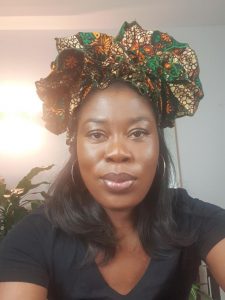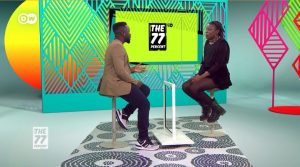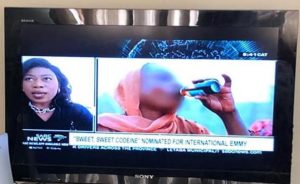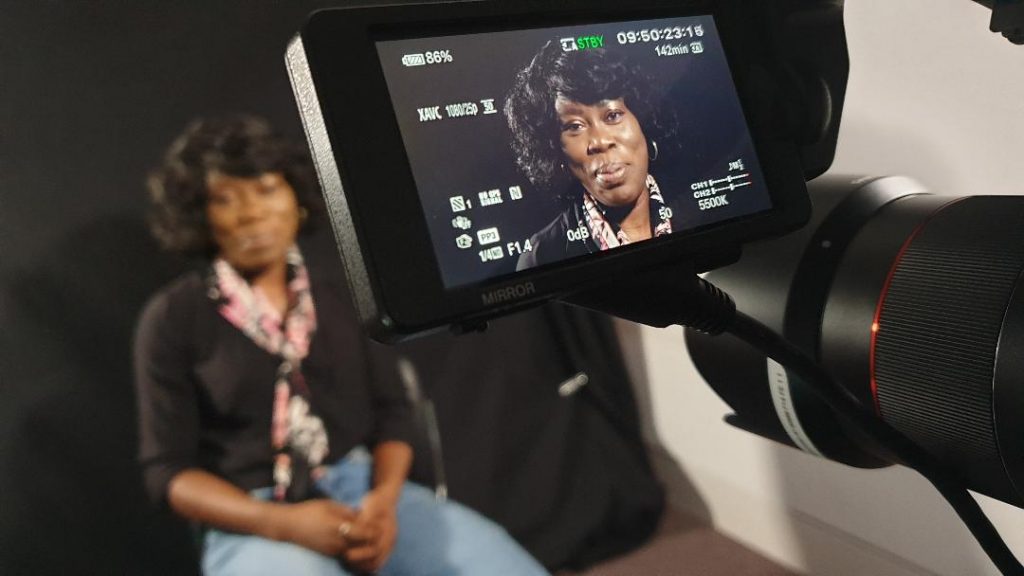Ruona J Meyer, 2019 Emmy Nominee is a multi-media journalist with 17 years’ experience in print, radio, wire agency and digital outlets across Nigeria, South Africa, and the UK. She was a pioneer staff of the BBC’s Pidgin service and has worked for Reuters South Africa, Financial Times of London, ThisDay and Next Newspapers in Nigeria.
She holds a first degree in Microbiology from the University of Lagos, a post-graduate degree in Journalism and Media Studies from Wits University in South Africa and Masters in broadcast journalism from the University of Westminster in the UK. She lives in Germany and is currently a PhD scholar, whilst freelancing as a reporter and editor for media outlets in Nigeria, Germany and the Netherlands.
In this online interview with Lekan Otufodunrin, she speaks on her recent mentoring project Ruona Tips Indepth, career-enhancing steps journalists should take and state of media practice in Nigeria.

Congratulations on the formal launch of Ruona Tips Indepth. What has been the response so far?
Thank you very much, and I mean thank you more for the privilege of an interview with Media Career Development Network – it is no secret that I am a big fan of what this network does for journalists across generations.
The response to Ruona Tips Indepth has been surprising. I do not usually like to talk in specifics about my clients so permit me to just say they are a cross-section. I have had interest from both in and outside Nigeria, and surprisingly, no one has taken up the group option. I made that option to help clients cut costs but it appears people prefer the direct access.
What informed the introduction of the concept?
So, I started #RuonaTips as a way to share tips in real-time that covered all areas of journalism, on Twitter as I was unable to visit Nigeria and continue my informal training sessions.
#RuonaTips then morphed into a set of handbooks which should be out by February or March this year – the pandemic has been a big challenge. However, as I continued the “lite” version on Twitter, I got a lot of inbox messages, emails and WhatsApp messages from people. I would often ask if I should do a Twitter thread, to tackle their enquiries but they would say “no.” Another thing was that the limited number of characters on Twitter meant I really could not go into detail as I would like, so I decided to make the option of booking sessions. So far, so good. I honestly cannot complain because as opposed to Twitter, I like to interact and hear the relief in people when they have a clearer path on tackling their work.
What is your ultimate goal with it?
To spread as much knowledge as possible, and get appreciated for it (in monetary terms). I do try to deliver much more than what every client pays for because I am also a customer of sorts in accessing and paying for knowledge. So, I ensure the enquiry form is detailed and put no limits on there so that the client comes into the hour fully ready to dive into tangible solutions and doesn’t spend 15 to 30 minutes explaining what they need help with. That would terribly unfair to paying clients.
You regularly share tips and opportunities for journalists online, do you think they are being maximised as much as they should by Nigerian journalists?
For the opportunities, YES! Journalists are really up on their feet, maximising opportunities. I help several prepare CVs, practise for interviews for these opportunities so it is always great to see them taking their career into their own hands.
For the tips, I’d say yes and no. I know many people are very receptive to the tips and very appreciative, but I also know old habits and set ways can be hard to change in newsrooms. I have journalists who have come to me, saying they tried their best but the majority want things a certain way. I tell them it is fine – so long as they know for themselves what is standard and legal, they should not despair. These things take time but I don’t generally dwell on whether the tips or opportunities are maximised – in the end, I actually do it for a clear conscience, because I am the product of people who helped me unreservedly, and so I have no choice but to give back. Whether it is maximised or not is not up to me.
Based on your experiences back in Nigeria and abroad, what are the practical steps journalists should take to enhance their careers?
They must learn the basics of media law – through Google, short courses or taking modules in university. No one will be able to cheat you and your reporting won’t put you in a legal mess if you know basic media law.
They must have a side hustle, to guarantee editorial independence:
Nowhere in the world is journalism often well-paid; the exceptions are few. When you have something else that brings income, it frees you from censorship by your employer, and manipulations from sources, especially in the African context. You need to be ready at any time to leave a job that takes your soul or decline a source’s Greek gift. I keep saying it – I sold kerosene by the bottle, second-hand clothes and then handbags; I have done all sorts to maintain my editorial independence. It doesn’t have to be anything big, but it has to be legal, and able to free you from folding into mediocrity just to keep the lights on and food on your plate. Editorial independence is what will distinguish you in the long run and give you the higher-paying jobs so please consider it a worthy investment.
Keep learning: It can be scary but try your best to learn new techniques. If you are in print, learn to cut audio, shoot video and vice-versa. You never know when it is that skill that will distinguish you.
Never cut corners and realise that excuses will cripple your rise: Self-explanatory. I won’t say more; let me keep it short and simple, as the newsroom slogan says.

Personally, what have you done to achieve your present status in the profession?
I am not sure what exactly my status is in this profession, to be honest, I am still hustling! So I don’t know how to answer. Let me stick with the first part of the question, therefore.
What I have done that I think has worked out well for me is that I make a commitment every day to do better in terms of my skills and delivery. I read a lot about techniques, follow journalists at all levels and interact. There is no such thing as a stupid question, in my eyes. I ask unashamedly and I am always ready to learn from whoever.
I am also very laser-focused on my goals. It doesn’t matter what anybody says is the standard – if it doesn’t fit in my goals, it will not be entertained for one second. At all! I have to admit I am almost ruthless with the way I guard my career. Mediocrity and dumbing down is not an option I ever entertain.
The last thing that I think works for me is trust – I prioritise winning and retaining the trust of my sources and clients and those who have worked with me, will often say they can trust me on the things that matter – honour and fairness.
This keeps me going.
READ ALSO: WHAT TO DO ABOUT DEPRESSION IN NEWSROOMS, ON THE BEAT
Considering the recent controversy over the BBC Sex for Grade report, what should be the acceptable standard for crediting reporters who worked on such stories for broadcast stations and honouring them with awards?
I do not think I have anything to say to that organisation itself – all I have to say is currently being fashioned by lawyers.
I will stick to the point I made earlier because there are journalists who read this, and journalists are my concern.
Dear journalists, before you start a story, either ask for a contract or go back to any contract signed. If you are negotiating a contract, negotiate what your title will be, and where it comes out. Try to aim high – producer, reporter, director, executive producer; those are the sweet spots. If you choose to go anonymous, let it be in writing, and try to choose something like your second name, and your parent’s maiden name as a surname – if you then have to prove it was you, to get recognition, that may be easier to do, for instance with your documents.
Anonymous or not, remember, no one can channel your right to visibility like you – insert yourself in the debate as safely as you can, and insist on your share of whatever benefits accrue, if all these things matter to you, that is. I repeat; your visibility is up to you. Do not count on others to be honourable – you may be spectacularly disappointed. Insist on your rights.
And credit goes both ways: dear journalists, do not watch your colleague in the same or other media house denied their rights and look away. A lack of Ubuntu is why African journalism is underdeveloped. Do not keep quiet when people call an author a bystander or cheerleader – have the honour to open your mouth and loudly (emphasis on loudly) correct anything and anyone that takes advantage of others because true journalists have honour.
What is your view of the criticism that Nigerian journalists are not doing enough investigative reporting?
I find it very annoying, to be honest. I have been very vocal about my views. The average Nigerian investigative journalist is doing investigations with their hands tied behind their backs – sources and even government officials prefer to speak to foreign journalists, and even sources and whistleblowers too – this is not hearsay, it’s one of several findings in my initial PhD research. Across four different African countries, we saw these patterns where the sources would make contact, then choose to only speak to colleagues outside the continent, who would then feedback to the African investigator.
Then, there is a dearth of funding – doing a proper story that covers decent wages, travel and administrative work, etc can take anywhere from $10k to $70k and above – who gives the average Nigerian investigator that? Which media house can consistently afford that? So, I really feel we all are doing the best we can, with what we can. There are so many great, unsung investigators in newsrooms across Nigeria that deserve support, not unfounded criticism, please.

Any other issue you want Nigerian journalists and their counterparts in the continent to pay attention to?
I’d say they should pay attention to the nuances of this job. Protect innocent sources by asking them the right questions and showing them in the best light – by this I mean discernment is key and you must make the decision, even when given consent to interview. Not every source benefits from the spotlight and not every source has the capacity to cope with the media fallout – true journalists prioritise minimising harm to the source, as opposed to seeking clicks.
A recent case – I won’t mention the names because even though I know when I mention the case, people already know names, I will never, ever fully reveal names of vulnerable people.
A source appeared unclear on the terms of their contract/engagement and unfortunately met several others who did not know these are some of the first questions to ask and dissect, to therefore know which party should be addressed, and how.
We ended up with a situation where subpar, sensationalist reporting left an individual with the short end of the stick and open to ridicule.
Please, pay attention to your rights and how this profession works, so you can get the best of it.
Journalism is a photocopying machine – what you put into it is what it will return to you. Feed it with mediocrity, and it will return the favour. Put in the work and feed it with excellence, and it will give you the same.


Very insightful Interview